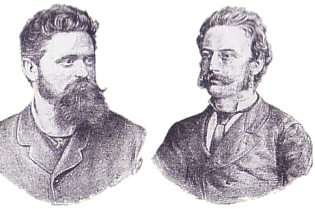Michael H. Hardern
Operetta Research Center
31 March, 2016
What the Opera House Zurich and the Komische Oper Berlin have in common are their architects: both were built by the famed team of Fellner & Helmer. For the rest, both houses have created a very different profile for themselves in recent years; and the Zurich Opera has not been famous for any operetta productions since the late 1930s, when many “degenerate” composers banned by the Nazis in German speaking territories premiered their works in Switzerland. Emmerich Kalman’s Kaiserin Josephine was one of these works. While the Komische Oper has – thankfully – returned to its original purpose, i.e. entertainment and glorious operetta, the company in Zurich is now also venturing into the operetta realm. Maybe to boost attendance figures?

The Viennese star architects Fellner & Helmer.
At the end of next season, in June 2017, Zurich’s new intendant Andreas Homoki will present his vision of Das Land des Lächelns, Lehár’s bitter-sweet tear jerker written for Richard Tauber. Homoki already tried operetta various time while he was still intendant in Berlin, at the Komische, but apart from his early Lustige Witwe, none of his operetta outings were particularly convincing. It seems that Homoki lacks the necessary showmanship, which became evident when Barrie Kosky took over in Berlin and showed an alternative way to do it. When Homoki recently presented My Fair Lady in Berlin, the simplicity (bordering on ordinariness) of his style and his inability to make a show “swing” with dance and music, was pretty evident. While intendant in Berlin, Homoki had Peter Konwitschny stage Land des Lächelns, which was broadcast on TV. An unusual, but interesting new interpretation. (The Chinese prince shoots himself in the end.)
Now, Homoki will stage the show himself. And his tenor will be Piotr Beczala.
He has already recorded Tauber lieder for Deutsche Grammophon, and he certainly is a vocally interesting standard option for Sou Chong. The conductor will be Fabio Luisi, who is unlikely to explore new sound worlds and ways of interpreting operetta – no Adam Benzwi or Florian Ziemen, to be sure.
It will be interesting to see whether this “operatic” Lehar will stir new interest in the genre, in Switzerland. Listening to historic recordings of the dance numbers from Land des Lächelns makes you realize that there is room for a sonic rediscovery of this score in the style of the 1920s. For that to happen, a bit of research and interest in adventure is needed. Not something Homoki or Luisi are famed for, alas.
For more information, click here.
